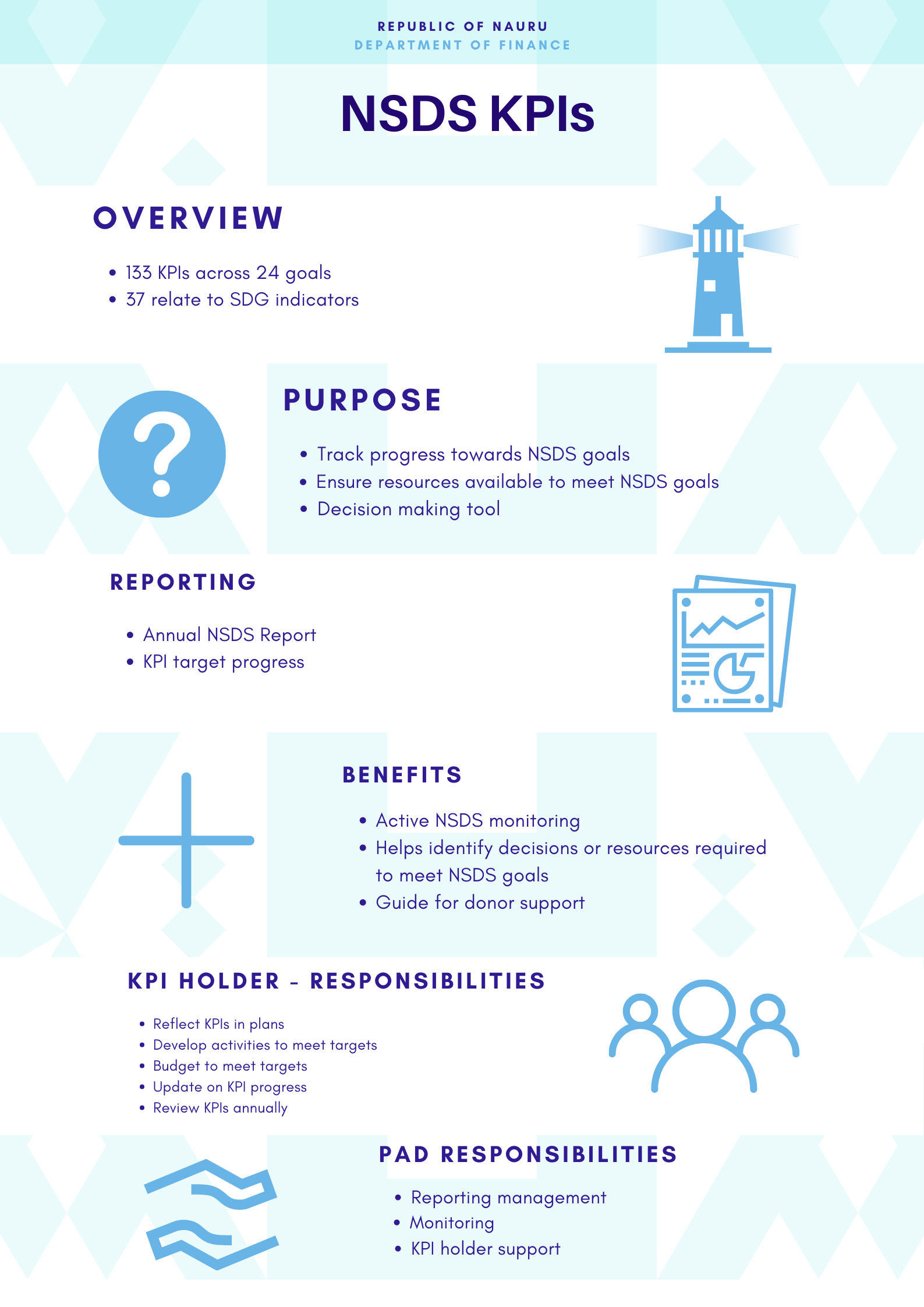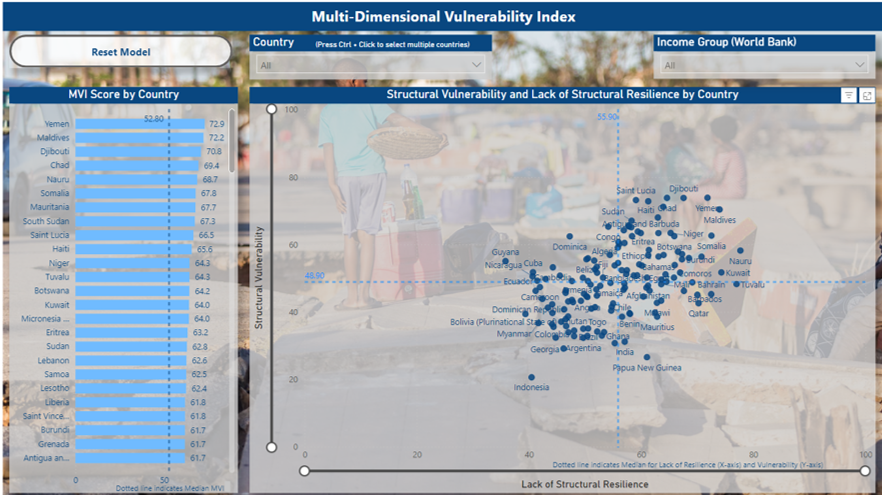PAD is established to lead the implementation of the National Sustainable Development Strategy and manage international development assistance provided to Nauru.
PAD’s activities align with Cross-Goal 1: Strengthen and develop the institutional capacity of the Nauru public service
PAD’s vision, mission and values mirror those of the Department of Finance: Effective and efficient allocation of resources for the development of Nauru.
PAD Core Mandates:
- Oversight of the National Sustainable Development Strategy (NSDS) implementation through sectoral and agency plans
- Support the formulation of sector strategies and AOPs
- Primary coordinator of Official Development Assistance to Nauru
- Custodian of development funds
- Facilitate implementation of ODA-supported activities.
Development Priorities
The Nauru Sustainable Development Strategy (NSDS) outlines the strategic priorities of the Nauruan Government and people of Nauru.
The current document, the Nauru Sustainable Development Strategy 2019-2030, is managed by the Planning and Aid Division (PAD). PAD develops an annual report summarising progress against NSDS goals, and maintains the NSDS KPIs.
The NSDS contains 24 goals across 4 sectors:
- Economic Sector
- Social and Community Sector
- Infrastructure Sector
- Cross-Cutting Sectors
Implementing the NSDS
Every organisation should use the NSDS as their basis for strategic planning and budget development. Donors should also use the KPIs to ensure their support to Nauru meets Nauru’s strategic priorities.
NSDS KPIs
The NSDS Key Performance Indicators (KPIs) help monitor progress towards Nauru’s NSDS Goals.
There are 133 Key Performance Indicators (KPIs) across the 24 NSDS goals.
The KPIs include annual targets and a 2030 target. The annual targets are updated each year.
| Econ Goal | No. of KPI | Social Goal | No. of KPI | Infra Goal | No. of KPI | Cross Cut Goal | No. of KPI | |
| 1 | 6 | 1 | 15 | 1 | 7 | 1 | 9 | |
| 2 | 2 | 2 | 6 | 2 | 11 | 2 | 8 | |
| 3 | 3 | 3 | 3 | 3 | 6 | 3 | 3 | |
| 4 | 2 | 4 | 5 | 4 | 15 | 4 | 3 | |
| 5 | 4 | 5 | 5 | 5 | 5 | 5 | 3 | |
| 6 | 4 | 6 | 3 | |||||
| 7 | 2 | 7 | 3 | |||||
| Total | 23 | 40 | 44 | 26 | 133 |
Organisations with responsibility for an NSDS KPI must plan activities to meet the KPI targets, and seek funding for those activities.
A summary of the NSDS KPI system can be found in the following flyer.

The Government has seven long term goals for Nauru:
- Stable, trustworthy, fiscally responsible government
- Access to quality education, formal and non-formal
- Improved health and well being
- Provision of enhanced social, infrastructure and utilities services
- Development of an economy based on multiple sources of revenue
- Enhance resilience against the impacts of climate change that is inclusive of rehabilitating and restoring degraded lands
- Development of domestic food production for food security
Donor activities on Nauru are regulated by a Donor Policy. This document helps Donors understand their obligations and operating context, helping to foster mutually beneficial donor programs.
The policy has been approved by the Nauru Sustainable Development Strategy Committee, and is managed by the Planning and Aid Division.
The Government presents an annual development budget. Links to the most recent ones are below.
Ministerial Statement- Annual Development Report FY2019-2020 22 October 2020
Development Fund Speech
The Government presents an annual development fund Annual Report. Links to the most recent ones are below.
Draft Documents
2023-2024 Annual Dev Fund Report (Draft)
2022-2023 Annual Dev Fund Report (Draft)
2023-2024 Half year Dev Fund Report (Draft)
2022-2023 Half year Dev Fund Report (Draft)
2021 Half year Dev Fund Report July-Dec (Draft)
Final Report
2021-22 Dev Fund Annual Report
2020-21 Dev Fund Annual Report
2019-20 Dev Fund Annual Report
2023-24 NSDS Annual Report
2022-23 NSDS Annual Report
2021-22 NSDS Annual Report
The NSDS Committee came into force in June 2022, and undertakes the following roles:
- monitors progress towards the NSDS KPIs
- endorses revised KPIs and KPI targets
- Harmonises donor and Government of Nauru support in furtherance of NSDS goals and provides input to donor programming and regional strategies and plans to ensure donor support aligns with NSDS priorities
- oversees sector plans, and
- completes partial and full reviews of the NSDS.
Each NSDS Sector (Economic, Social, Infrastructure and Cross-Cutting) is represented by Secretary-level Departmental representatives.
While external representatives may be called to present to the Committee or may request to brief the Committee, only Government of Nauru Departmental Secretaries may be members of the Committee.
The NSDS Committee replaces the former National Development Planning Committee.
The NSDS Committee is supported by two sub-committees – the Economic Sector Sub-Committee and the Infrastructure Sector Sub-Committee.
The primary objective of the Economic Sector Committee is to ensure holistic oversight of the economic sector and encourage innovative and comprehensive proposals to enhance Nauru’s revenue base and economic and financial management. This committee will be responsible for considering pertinent economic and financial issues and providing proposals for the NSDS Committee to consider submitting to the Government. The Committee will also monitor sector KPI progress and provide input to relevant strategies, plans and programs.
The primary objective of the Infrastructure Sector Committee is to ensure effective planning, execution, and management of infrastructure projects.
This committee will be responsible for evaluating the current state of infrastructure, identifying areas for improvement, and proposing strategies to enhance the infrastructure within Government and the community of Nauru. The Committee will also monitor sector KPI progress and provide input to relevant strategies, plans and programs.
Departments/SOEs requiring visas for donor funded visitors for projects should use this letter to organise the relevant visas with the Department of Immigration.
Nauru welcomes the adoption of the Multi-Dimensional Vulnerability Index by the UN General Assembly in August 2024
The MVI involves the identification of “the most vulnerable.” It allows vulnerable countries to provide granularity and greater characterization of their specific vulnerability and resilience factors, including non-structural resilience through the development of the vulnerability and country resilience profiles (VRCP). Through this lens, the unique predicament of Small Island Developing States (SIDS) like Nauru becomes clear.
The use of measures such as Gross Domestic Product or Gross National Income do not capture the variability, fragility and limitations of SIDS. Use of GNI and GDP alone is a barrier to vulnerable nations like Nauru accessing the donor support so desperately needed to mitigate their inherent economic, social and environmental vulnerabilities.
Using the MVI, Nauru is the fifth most vulnerable country, and the most vulnerable Pacific nation. This presents a vastly different picture to that visible when only viewing Nauru’s GNI or GDP.
MVI – Preliminary Country Scores

The MVI provides a practical solution to ensuring that Nauru is measured as it truly is – a struggling developing small island developing state in great need of significant financial aid. The MVI will help Nauru to prove that determination of Nauru’s eligibility for ODA and concessional financing should be based on its inherent economic vulnerability as opposed to a temporary increase in GNI.
Nauru encourages use of the tool by donors in developing strategies and programs, and welcomes support to improve data collection for MVI updates.
SDG progress summary FY 2023-24-Draft not Passed by Parliament.
SDG Progress Summary FY2022-23
SDG Review 2022 Final
In 2019, Nauru undertook a voluntary review of its implementation of the 2030 Sustainable Development Goals.
NAURU VNR REPORT FINAL
Contacts
Mr Samuel Grundler
Acting Deputy Secretary PAD
Planning and Aid Division
Department of Finance
Government Offices
Yaren District
Nauru
